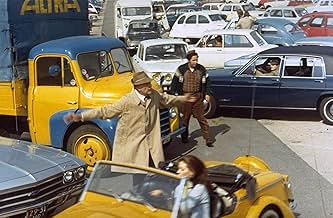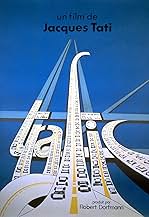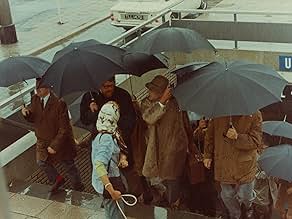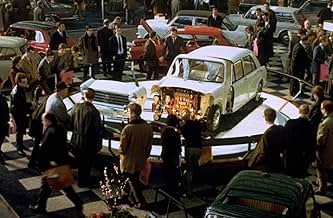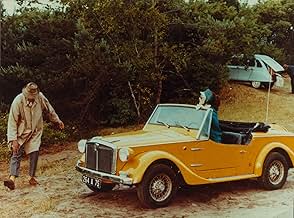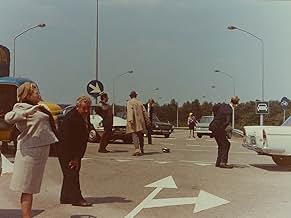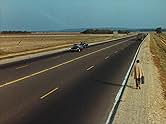IMDb RATING
7.0/10
8.2K
YOUR RATING
Mr. Hulot drives a recreational vehicle from Paris to Amsterdam in his usual comical, disastrous style.Mr. Hulot drives a recreational vehicle from Paris to Amsterdam in his usual comical, disastrous style.Mr. Hulot drives a recreational vehicle from Paris to Amsterdam in his usual comical, disastrous style.
- Director
- Writers
- Stars
- Nominated for 1 BAFTA Award
- 1 win & 1 nomination total
Jacques Tati
- Monsieur Hulot
- (as Mr. Hulot)
Honoré Bostel
- Director of ALTRA
- (as Honore Bostel)
François Maisongrosse
- François
- (as F. Maisongrosse)
Marco Zuanelli
- Mechanic
- (as Mario Zanuelli)
- Director
- Writers
- All cast & crew
- Production, box office & more at IMDbPro
7.08.1K
1
2
3
4
5
6
7
8
9
10
Featured reviews
The last we'll see of M. Hulot, and a melancholy farewell it is
What can we make of Trafic, Jacques Tati's last film? It certainly isn't a major success, as M. Hulot's Holiday and Mon Oncle are. It's not a gallant failure, as I believe Playtime is. It seems to me that it is a sad, sometimes amusing combination of those things that made Tati so unique, so funny, so problematic and so drawn to making mundane social commentary. There must be something in the water we drink or the bread we eat that causes some humans with extraordinary artistic gifts to believe that because they are great artists they also must have equally great gifts of social philosophy, gifts which they are determined to share with us.
By the time Tati made Trafic, four years after Playtime, he had lost ownership of his life's work, his films, and most of his money. Playtime was a debacle. He spent a fortune, his own as well as others, to craft a perfectionist's dream of artistic control. He ended up with a movie that was filled with surprises, layer on layer of -- for wont of a better term -- sight and sound gags, with fascinatingly complex amusements for an audience willing to let the situations develop around them, and seemingly endless, obvious and often impersonal visual commentary on the homogenizing of modern society and the perils of technology. Most moviegoers were not all that interested.
Now, with Trafic, Mr. Hulot has come back. He is a designer for a Paris auto company, and he has developed a camping vehicle like no other. Trafic is the story of Mr. Hulot's delivery of his camper from Paris to an international auto show in Amsterdam. It's a long journey filled with misunderstandings, accidents and crashes, a PR executive with an endless number of dress changes, cops, windshield wipers and a lot of cars. The movie is as exquisitely built as an expensive vest pocket timepiece. Unfortunately, time has a way of catching us up, and Mr. Hulot now is a man past middle age, where male innocence seems unlikely and somewhat unattractive. Tati was 64 now, and he looks it. The gentle, innocent mime who meets unexpected personal situations at a small seaside hotel or tries to help his young nephew has been replaced by a well-meaning older gentleman we more often observe than we root for. His encounters with the clichés of faceless technology and bumbling bureaucracy are increasingly with people with few understandable, sympathetic foibles. Mr. Hulot to be at his best needs people we can come to like and interact with, not simply interchangeable stand- ins...even if they're picking their noses in the privacy of their cars (in a sight gag probably only Tati could have pulled off).
Mr. Hulot only appeared in four feature-length movies. It is Tati's genius that in less than 500 minutes he gave us such a memorable and appealing human being. Tati's layering of sight gags is unique and often intensely and unexpectedly funny. With Trafic, however, I found my interest more intellectual than anything else. There were stretches of the film that simply weren't all that engaging. And this, of course, is all just opinion.
By the time Tati made Trafic, four years after Playtime, he had lost ownership of his life's work, his films, and most of his money. Playtime was a debacle. He spent a fortune, his own as well as others, to craft a perfectionist's dream of artistic control. He ended up with a movie that was filled with surprises, layer on layer of -- for wont of a better term -- sight and sound gags, with fascinatingly complex amusements for an audience willing to let the situations develop around them, and seemingly endless, obvious and often impersonal visual commentary on the homogenizing of modern society and the perils of technology. Most moviegoers were not all that interested.
Now, with Trafic, Mr. Hulot has come back. He is a designer for a Paris auto company, and he has developed a camping vehicle like no other. Trafic is the story of Mr. Hulot's delivery of his camper from Paris to an international auto show in Amsterdam. It's a long journey filled with misunderstandings, accidents and crashes, a PR executive with an endless number of dress changes, cops, windshield wipers and a lot of cars. The movie is as exquisitely built as an expensive vest pocket timepiece. Unfortunately, time has a way of catching us up, and Mr. Hulot now is a man past middle age, where male innocence seems unlikely and somewhat unattractive. Tati was 64 now, and he looks it. The gentle, innocent mime who meets unexpected personal situations at a small seaside hotel or tries to help his young nephew has been replaced by a well-meaning older gentleman we more often observe than we root for. His encounters with the clichés of faceless technology and bumbling bureaucracy are increasingly with people with few understandable, sympathetic foibles. Mr. Hulot to be at his best needs people we can come to like and interact with, not simply interchangeable stand- ins...even if they're picking their noses in the privacy of their cars (in a sight gag probably only Tati could have pulled off).
Mr. Hulot only appeared in four feature-length movies. It is Tati's genius that in less than 500 minutes he gave us such a memorable and appealing human being. Tati's layering of sight gags is unique and often intensely and unexpectedly funny. With Trafic, however, I found my interest more intellectual than anything else. There were stretches of the film that simply weren't all that engaging. And this, of course, is all just opinion.
Slowing Down
There ends up a lot to enjoy in Jacques Tati's final theatrically released feature film, but I think it's obvious that Tati was best when he was given total control of everything, gobs of money, and an unusual amount of time to craft the comedy. Out in the wilds, given the road trip format of the film's story, the comedic stylings never reach the delirious highs of any of his previous three films, but his talent was too strong, his ideas too clear, and his heart too warm for the film overall to descend into something less than worthwhile.
M. Hulot (Tati) works for a small car manufacturer as a designer, and they are putting the final touches on their camping car for a large car expo in Amsterdam. What follows is a misadventure as everything goes wrong on the journey from the truck they're using to transport the car breaking down multiple times to being held up at the border with the Netherlands to needing to get the car slightly fixed after an accident. It's a leisurely paced film with an episodic structure, moreso obviously than any of Tati's films since Jour du Fete. What knits it all together is, like all the rest, Tati's sense of comedy.
Each episode was either filmed on a closed set or at a location, and, without fail, the sequences filmed on sets are funnier than those filmed on locations. I have a theory that Tati was allowed more time to figure out comedic bits in sets than on location, so he was able to find more funny things to happen, like the dance of workers in the garage at the beginning as they take each other's equipment leading to one working pulling out a series of drawers and walking up them to account for his missing ladder. That's funny. The scene where Tati has to run across a field and get gas from a small town's gas station is less so, the comedic bits limited to pretty much Tati running back and forth from where he left his gas can when he gets a ride back to the broken down truck.
This dichotomy between the higher quality gags on sets and the lower quality gags on location continues for a while, much more heavily weighted towards the location stuff. One piece that pops up from time to time that feels like a highly topical and hard to translate joke is a gas station that gives out artistic busts of famous men to each customer. I think it's supposed to be a comment on the faux-culture you find at gas stations in Europe, but it's a bit lost on me. There are good bits with the heads (like a customs officer looking into the back of the truck and finding a stone head looking up at him), but the actual meaning of the bit is something I don't really understand.
The film as a whole ends up feeling kind of random, matching the episodic nature of the film's storytelling structure, until Tati and his compatriots have to stop in a small town in the Netherlands to fix the camping car's fender. It takes them more than a day to get it fixed, and it's here that the overall point of the film begins to become clear. Throughout the film, we've seen the Apollo 11 mission on televisions in the foregrounds and backgrounds of shots. We've also been passing through beautiful country. We've seen Tati and his fellow passengers dismiss all of it because the speed of the road kept them from it. Stranded on a riverside, waiting for the English speaking mechanic to get around to fixing their car, they have to take the time to take in what's going on around them. They can appreciate the look of the river, waving to the mechanic's neighbors while they eat a meal with him. They can actually watch Neil Armstrong take his first steps on the moon and then mimic it out of admiration. They've been given a chance to slow down and take in the wonders of the world.
Given Tati's previous two films, it would be a safe assumption that Tati's view of the wonders of the world tended to be older, like ancient rivers or well-lived in houses. However, the inclusion of the Apollo moon mission expands that. Tati wasn't a luddite completely. He admired the advancement of human technology, but he also seemed to think that giving into it completely was taking something away from the human experience. In PlayTime, it seemed to alienate people from each other. In Trafic, it seems to alienate people from the beautiful things, both natural and manmade, both old and new. Take time to see the world around you.
And the literal subject of the film, a race across several European nations to get to a car expo, is the perfect vehicle to attach this idea to. The story reinforces the point rather nicely that way.
It's just unfortunate that much of the comedic stylings in the early parts of the film are just not that funny. They're often nice and slightly amusing, but not much more than that. I wouldn't go so far as to say that there's dead space because Tati fills the screen with motion as much as he can, but it just doesn't have the punch as something like the first half of PlayTime had.
I think it should also be noted that I think this is a thin metaphor for Tati's own mental space as well. This is the first Hulot film where Hulot has a job, and it's a designer of a new, fancy, and incredibly dense camping car that can do so much more than the outside look at it seems to indicate (there's a fun scene where Tati gets to show off all of the features to border patrol police officers that surely inspired half of Wes Anderson's entire imagination). They get to the expo, and it's too late, it's closed. Hulot's creation is a financial flop because they never even got to show it off, and yet, Hulot is unbowed. He's proud of his creation whether it was a financial success or not. If that's not Tati reflecting back on the artistic merit and commercial failure of PlayTime, I don't know what is.
It's not his best work, but like everything else it has intelligence, a sweet hidden message, and plenty of laughs. Trafic is a nice farewell to the cinema from a master of comedic cinematic storytelling.
M. Hulot (Tati) works for a small car manufacturer as a designer, and they are putting the final touches on their camping car for a large car expo in Amsterdam. What follows is a misadventure as everything goes wrong on the journey from the truck they're using to transport the car breaking down multiple times to being held up at the border with the Netherlands to needing to get the car slightly fixed after an accident. It's a leisurely paced film with an episodic structure, moreso obviously than any of Tati's films since Jour du Fete. What knits it all together is, like all the rest, Tati's sense of comedy.
Each episode was either filmed on a closed set or at a location, and, without fail, the sequences filmed on sets are funnier than those filmed on locations. I have a theory that Tati was allowed more time to figure out comedic bits in sets than on location, so he was able to find more funny things to happen, like the dance of workers in the garage at the beginning as they take each other's equipment leading to one working pulling out a series of drawers and walking up them to account for his missing ladder. That's funny. The scene where Tati has to run across a field and get gas from a small town's gas station is less so, the comedic bits limited to pretty much Tati running back and forth from where he left his gas can when he gets a ride back to the broken down truck.
This dichotomy between the higher quality gags on sets and the lower quality gags on location continues for a while, much more heavily weighted towards the location stuff. One piece that pops up from time to time that feels like a highly topical and hard to translate joke is a gas station that gives out artistic busts of famous men to each customer. I think it's supposed to be a comment on the faux-culture you find at gas stations in Europe, but it's a bit lost on me. There are good bits with the heads (like a customs officer looking into the back of the truck and finding a stone head looking up at him), but the actual meaning of the bit is something I don't really understand.
The film as a whole ends up feeling kind of random, matching the episodic nature of the film's storytelling structure, until Tati and his compatriots have to stop in a small town in the Netherlands to fix the camping car's fender. It takes them more than a day to get it fixed, and it's here that the overall point of the film begins to become clear. Throughout the film, we've seen the Apollo 11 mission on televisions in the foregrounds and backgrounds of shots. We've also been passing through beautiful country. We've seen Tati and his fellow passengers dismiss all of it because the speed of the road kept them from it. Stranded on a riverside, waiting for the English speaking mechanic to get around to fixing their car, they have to take the time to take in what's going on around them. They can appreciate the look of the river, waving to the mechanic's neighbors while they eat a meal with him. They can actually watch Neil Armstrong take his first steps on the moon and then mimic it out of admiration. They've been given a chance to slow down and take in the wonders of the world.
Given Tati's previous two films, it would be a safe assumption that Tati's view of the wonders of the world tended to be older, like ancient rivers or well-lived in houses. However, the inclusion of the Apollo moon mission expands that. Tati wasn't a luddite completely. He admired the advancement of human technology, but he also seemed to think that giving into it completely was taking something away from the human experience. In PlayTime, it seemed to alienate people from each other. In Trafic, it seems to alienate people from the beautiful things, both natural and manmade, both old and new. Take time to see the world around you.
And the literal subject of the film, a race across several European nations to get to a car expo, is the perfect vehicle to attach this idea to. The story reinforces the point rather nicely that way.
It's just unfortunate that much of the comedic stylings in the early parts of the film are just not that funny. They're often nice and slightly amusing, but not much more than that. I wouldn't go so far as to say that there's dead space because Tati fills the screen with motion as much as he can, but it just doesn't have the punch as something like the first half of PlayTime had.
I think it should also be noted that I think this is a thin metaphor for Tati's own mental space as well. This is the first Hulot film where Hulot has a job, and it's a designer of a new, fancy, and incredibly dense camping car that can do so much more than the outside look at it seems to indicate (there's a fun scene where Tati gets to show off all of the features to border patrol police officers that surely inspired half of Wes Anderson's entire imagination). They get to the expo, and it's too late, it's closed. Hulot's creation is a financial flop because they never even got to show it off, and yet, Hulot is unbowed. He's proud of his creation whether it was a financial success or not. If that's not Tati reflecting back on the artistic merit and commercial failure of PlayTime, I don't know what is.
It's not his best work, but like everything else it has intelligence, a sweet hidden message, and plenty of laughs. Trafic is a nice farewell to the cinema from a master of comedic cinematic storytelling.
Beep beep, Hulot!
'Trafic (1971)' - with one 'f' - isn't about drugs, it's about cars. More specifically, it's about the chaos of car travel, the mishaps and hiccups that occur when driving a metal box from one location to another. With a more clear narrative drive than its predecessors, Mr. Hulot's final outing sees its clumsy main character accompany a camping car he's designed to a trade show in Amsterdam. The perpetually pleasant protagonist actually has a job this time, and he's dedicated to doing it as well as he possibly can - which, of course, isn't as well as his employers would like. This mildly amusing comedy isn't particularly funny, but it has a handful of humourous moments and it's generally pleasant. It ambles about amiably, and it somehow never comes close to being boring despite the fact that its slow pacing emphasises the gaps between its giggles. Its ambition is scaled back when compared to 'Playtime (1967)' and it lacks that superior picture's truly scrumptious production design, but it's more compelling - and chucklesome - than 'Monsieur Hulot's Holiday (1953)' and 'Mon Oncle (1958)'. It isn't brilliant, but it's enjoyable enough for what it is. It's a very specific sort of experience, one almost exclusive to its series. Personally, this type of film is hit or miss for me. Now I've seen all of Hulot's outings, I can safely say I actively enjoyed two of them. However, I can see how some people would enjoy them all, and to a much higher degree than I do. This final Hulot film is well-made, charming and fairly amusing. It's a bit of an odd coda to 'Playtime (1967)', which is considered a masterpiece by many, but it's a solid effort nevertheless.
Leave your expectations behind and let this movie win you
I didn't know what to expect when I went to see this movie many years ago. I was delightfully surprised. This is a very funny movie, but it is subtle in it's kookie-ness.
Two men have developed a new camping van and have set out to take it to an outdoors show. This should be an ordinary trip full of coffee, donuts and long boring stretches of road. But no, this does not take place in America; it starts in Paris and the goal is Amsterdam. Much can happen along such a route, and in this case, just about everything does.
Will they make it there before the show has ended? Will their dreams of being successful come to pass? These are the driving questions of this movie. They seem rather uninteresting goals, don't they? Nevertheless, these characters will likely win you over and have you rooting for them as they make their bumbling stab at entrepreneurship. Or, just as likely, you may find yourself enjoying every obstacle that steps in their way, as I did.
Much is unexpected in this movie and that's what makes it fun! Share this one with your friends and they will thank you.
Note: this is a comedy, there's not much gore or street fights, shoot-outs or bombs taking out city blocks, so be forewarned, this movie with not shake your subwoofer.
Although not a spy movie, it somewhat reminds me of the original "Tall Blonde Man with One Black Shoe": another wonderful French comedy.
Two men have developed a new camping van and have set out to take it to an outdoors show. This should be an ordinary trip full of coffee, donuts and long boring stretches of road. But no, this does not take place in America; it starts in Paris and the goal is Amsterdam. Much can happen along such a route, and in this case, just about everything does.
Will they make it there before the show has ended? Will their dreams of being successful come to pass? These are the driving questions of this movie. They seem rather uninteresting goals, don't they? Nevertheless, these characters will likely win you over and have you rooting for them as they make their bumbling stab at entrepreneurship. Or, just as likely, you may find yourself enjoying every obstacle that steps in their way, as I did.
Much is unexpected in this movie and that's what makes it fun! Share this one with your friends and they will thank you.
Note: this is a comedy, there's not much gore or street fights, shoot-outs or bombs taking out city blocks, so be forewarned, this movie with not shake your subwoofer.
Although not a spy movie, it somewhat reminds me of the original "Tall Blonde Man with One Black Shoe": another wonderful French comedy.
A Piece of Cinema History
Whilst not Tati's best by any stretch of the imagination the genius of the man still shines through. Having lived in France for a while I see more humour in this film, particularly in the comedic observation, than before. The French may be fanatical about cinema and may well have produced some of the world's greatest film makers but out and out comedy probably ranks well down in terms of output. Maybe it's something to do with the French sense of humour (whatever that may be). Unlike British, and to a lesser extent US comedy, self-parody is not a French strength. It could be something to do with their history and education but the culture, so strong in literature and the arts seems not to demean itself with pure laughter. Most cinema fans would probably be hard put to list 10 French comedies - other than perhaps drama with the occasional comic undertones. Les Visiteurs (the original not the recent re-make) is probably one of the better examples but here again there's little or no self-mocking.
So it was left to Tati to mine the seam - and how well he mined it. Here he takes the smallest of French (dare I say Parisian) mannerisms and extends them into lengthy scenes of beautifully observed comedy. Whether it's the windscreen wipers in tune with the occupants or the nose-picking drivers, he asks the French to at least smile, if not laugh out loud, at themselves.
Yes, the film does move at rather a slow pace and there are times when the comic observation sags, but the sight of dear old M Hulot in his mackintosh, loping along with pipe jutting from his mouth will ever remain one of cinema's delights.
So it was left to Tati to mine the seam - and how well he mined it. Here he takes the smallest of French (dare I say Parisian) mannerisms and extends them into lengthy scenes of beautifully observed comedy. Whether it's the windscreen wipers in tune with the occupants or the nose-picking drivers, he asks the French to at least smile, if not laugh out loud, at themselves.
Yes, the film does move at rather a slow pace and there are times when the comic observation sags, but the sight of dear old M Hulot in his mackintosh, loping along with pipe jutting from his mouth will ever remain one of cinema's delights.
Did you know
- TriviaThe end scene (people walking with umbrellas between parked cars) was shot on the parking lot of the then still functioning Amsterdam Ford factory.
- GoofsSeveral (Dutch) license plates can be seen on various different vehicles, sometimes even in the same shot. For instance the license plate "FT-92-65" can be seen in the petrol station scene on both a Peugeot 504 and a Chrysler 180. Later the same plate is on a Peugeot 204 passing in front of the exhibition center. In the "road rage" scene the number 76-04-NF is on both the Renault 16 and the Citroën ID. Shortly after the same plate is on an Opel Kadett parked in front of the exhibition center.
- Crazy creditsIn the opening credits, Tati is billed simply as "M. Hulot." He does, of course, use his real name for his writing and directing credits.
- ConnectionsFeatured in Omnibus: Monsieur Hulot's Work (1976)
- How long is Traffic?Powered by Alexa
Details
- Release date
- Countries of origin
- Official site
- Languages
- Also known as
- Prometna zmeda
- Filming locations
- Production companies
- See more company credits at IMDbPro
Box office
- Gross worldwide
- $51,348
- Runtime
- 1h 36m(96 min)
- Sound mix
- Aspect ratio
- 1.37 : 1
Contribute to this page
Suggest an edit or add missing content

